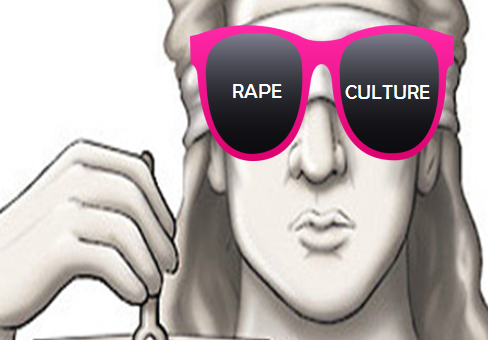
Judge Camp and The Beast of Rape Culture
Post by Adrienne Moya, Victim Services Medical Support Worker
 We tell women not to take on more responsibility or burden than they need to when navigating the criminal justice system. We tell them to focus on their wellbeing, and communicate their needs, safety concerns, and the impacts they are experiencing to us and the different players in these systems. We tell them to allow the police do their job of investigating the crime and coordinating protection measures for victims. Let crown counsel do their job, of attending to inconsistencies or issues with evidence in a case. Let the judge do their job, of analyzing the information they are presented with, seeing past the picture being painted by defence, and suspending their assumptions, judgments, and biases; and in their place hold both openness and an understanding of the current context and history of sexual assault.
We tell women not to take on more responsibility or burden than they need to when navigating the criminal justice system. We tell them to focus on their wellbeing, and communicate their needs, safety concerns, and the impacts they are experiencing to us and the different players in these systems. We tell them to allow the police do their job of investigating the crime and coordinating protection measures for victims. Let crown counsel do their job, of attending to inconsistencies or issues with evidence in a case. Let the judge do their job, of analyzing the information they are presented with, seeing past the picture being painted by defence, and suspending their assumptions, judgments, and biases; and in their place hold both openness and an understanding of the current context and history of sexual assault.
Unfortunately, I don’t think I could reassure a client that the judge they will testify before has an understanding of rape culture and the context of sexual assault. This is because I know too many examples of judges who have favoured and served to protect rapists when the evidence says they shouldn’t. There are many Judge Camps out there, although others may not be as vocal in the courtroom so as to reveal their biases, the stereotypes they hold, and I would argue, their misogyny. The judicial review of Judge Camp is most definitely about judge camps actions, but it’s also way bigger than just him. Judge Camp is but one hair on the back of a much bigger reckless beast that has been sitting in court rooms for decades, denying women’s experiences of violence and giving rapists a free pass. This beast is rape culture.
What I want is for the bar to be set far higher, such that judges actively work to prevent rape culture from governing the decisions they make by sensitizing themselves to the experiences of survivors, getting informed about trauma’s impacts on the brain, and educating themselves about the context in which sexual assault takes place.
Don’t misunderstand me; I do not actually believe rape culture is an invisible force that has a supernatural hold on us. It is absolutely fueled and perpetuated by individuals, institutions, and government— which is exactly why those in positions of power need to do that much extra work to unlearn what rape culture has taught us, and work towards a society where women are free from violence.
I know these things are possible within the current system we have. Last week I was at trial with a client and while she was being cross examined the judge intervened at multiple points. He interrupted defence and pointed out that he was relying on stereotypes about sexual assault survivors. He questioned defence’s direction when he felt it was encroaching on the territory of sexual history. He blocked fishing questions defence asked, the answers to which my client could not have had knowledge of. The judge interrupted and objected to the line of questioning about 10 times more often than crown counsel did, to ensure the cross examination was ethical and legally sound. He also showed compassion for my client by being patient with her when she forgot to speak up, reminding her she could ask for her statement, or for a break, and acknowledging how difficult it was for her to go on the stand and talk about traumatic experiences. Doing these things do not bias him in favour of the victim, or work to discredit his ability to be neutral and unbiased; they make him a good judge.
I want for women who are preparing for trial to be able to expect these standards of conduct at the very least. As long as Judge Camp is setting an example within our criminal justice system, this is not possible.
- On September 14, 2016

